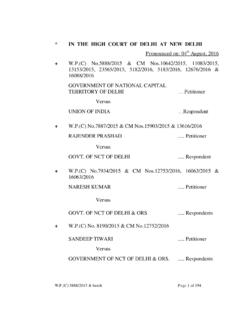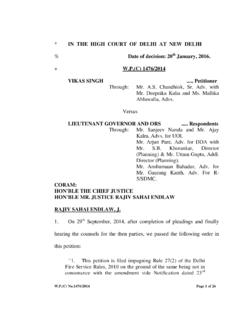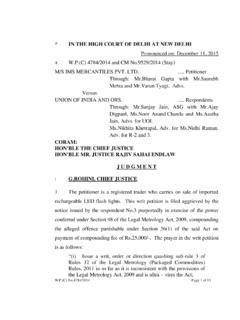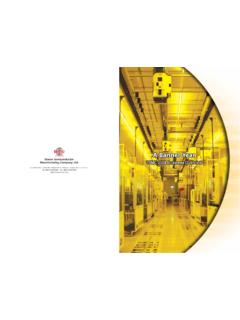Transcription of IN THE HIGH COURT OF DELHI AT NEW DELHI Reserved on: …
1 FAO (OS) (COMM) 86/2017 & 76/2017 Page 1 of 60 * IN THE HIGH COURT OF DELHI AT NEW DELHI Reserved on: Pronounced on: + FAO (OS) (COMM) 86/2017, , 14335, 15669, 17064/2017 NUZIVEEDU SEEDS LTD. AND ORS..Appellants Through: Sh. Sundaram, Sh. Jayant Bhushan, Sr. Advocate with Ms. Diya Kapur, Ms. Swathi Sukumar, Ms. Swati Setia, Sh. Essence Obhan, Ms. Himanie Katoch, Sh. Nikhil Ratti Kapoor, Ms. Aakanksha Kaul, Ms. Pooja Katara, Ms. Charul Yadav, Sh. Abhishek Saket, Ms. Vijaya Singh, Sh. Jatin and Ms. Rohini Musa, Advocates. Versus MONSANTO TECHNOLOGY LLC AND ORS..Respondents Through: Sh. Sandeep Sethi, Ms. Prathiba. M. Singh, Sh. Lall, Sr. Advocates with Ms. Bitika Sharma, Sh. Kapil Midha, Ms. Namrita Kochhar, Ms. Deepshika Malhotra, Sh. Adarsh Ramanujam, Sh.
2 Anil Dutt, Sh. Shantanu Agarwal, Sh. Rishi Agarwala, Ms. Anusuya Nigam, Sh. Lakshay Kaushik and Ms. Ruchika Wadhawan, Advocates. Sh. Sunil Mathews, Advocate, for UOI. Sh. Neel Mason and Ms. Ridhima, Advocates, for Amar Biotech Ltd. Sh. Anup Bhambhani, Sr. Advocate with Sh. Jatin Mongia and Sh. Animesh Kumar, Advocate, for applicant in FAO (OS) (COMM) 86/2017 & 76/2017 Page 2 of 60 + FAO (OS) (COMM) 76/2017, CAV. 328/2017, MONSANTO TECHNOLOGY LLC AND ORS..Appellants Through: Sh. Sandeep Sethi, Ms. Prathiba. M. Singh, Sh. Lall, Sr. Advocates with Ms. Bitika Sharma, Sh. Kapil Midha, Ms. Namrita Kochhar, Ms. Deepshika Malhotra, Sh. Adarsh Ramanujam, Sh. Anil Dutt, Sh. Shantanu Agarwal, Sh. Rishi Agarwala, Ms. Anusuya Nigam, Sh. Lakshay Kaushik and Ms.
3 Ruchika Wadhawan, Advocates. NUZIVEEDU SEEDS LTD. AND ORS..Respondents Through: Sh. Sundaram, Sh. Jayant Bhushan, Sr. Advocate with Ms. Diya Kapur, Ms. Swathi Sukumar, Ms. Swati Setia, Sh. Essence Obhan, Ms. Himanie Katoch, Sh. Nikhil Ratti Kapoor, Ms. Aakanksha Kaul, Ms. Pooja Katara, Ms. Charul Yadav, Sh. Abhishek Saket, Ms. Vijaya Singh, Sh. Jatin and Ms. Rohini Musa, Advocates. CORAM: HON'BLE MR. JUSTICE S. RAVINDRA BHAT HON'BLE MR. JUSTICE YOGESH KHANNA MR. JUSTICE S. RAVINDRA BHAT % Facts 1. This common judgment disposes of two appeals (FAO (OS) 86/2017 and FAO (OS) (COMM) 76/2017). Monsanto Technology LLC (referred to as Monsanto ) prefers FAO (Comm) 76/2017; Nuziveedu, the appellant in FAO (OS) 86/2017, would be referred to as such in this judgment. The facts in Monsanto s appeal are referred to, for convenience.
4 2. The second and third appellants in Monsanto s appeals are subsidiaries/affiliates of Monsanto Technology LLC ( Monsanto ). Monsanto set up the third appellant as a FAO (OS) (COMM) 86/2017 & 76/2017 Page 3 of 60 joint venture with Maharashtra Hybrid Seed Company ( Mahyco ) to undertake Bt. Trait1 licensing business in India. These entities (Monsanto, Mahyco et al) are referred to collectively as Monsanto . Nuziveedu is a private sector seeds company in India. The other respondents (in Monsanto s appeals) are Nuziveedu s subsidiaries; all are engaged in the same business of, inter alia, developing new hybrids and varieties of cotton. Nuziveedu and its subsidiaries currently possess approvals for over 29% of all cotton hybrids approved by the Genetic Engineering Appraisal Committee ( GEAC ), one of the regulatory bodies constituted under the Environment (Protection) Act, 1986 and rules thereunder, by the Ministry of Environment, Forest and Climate Change, to accord approval on proposals relating to the release of genetically modified organisms and products into the environment.
5 3. Monsanto appeals the judgment of a learned single judge (the impugned judgment ) which directed it to continue supplying Bt. Cotton transgenic variety (Donor Seeds) under the 2015 Sub-License Agreements except as to the rate of trait fee payable, thereunder. The learned single judge also held that Nuziveedu would be liable to tender, and pay, the trait fee to Monsanto, for the use of the suit patent and trademarks, at such rates as are in accord with the prevalent local laws, as in force or revised from time to time; and (iii) upon being suitably notified, be obliged to execute necessary documents so as to render the contract(s) in accord with the "GM Technology (GM Trait) Licensing Agreement" as prescribed under the "Licensing and Formats for GM Technology Agreement Guidelines, 2016", notified by the Government of India.
6 4. Nuziveedu appeals the rejection of its application, which urged rejection of Monsanto s patent (Indian Patent No. 214436, covering an invention titled METHODS FOR TRANSFORMING PLANTS TO EXPRESS BACILLUS THURINGIENSIS DELTAENDOTOXINS - hereafter called the subject patent ) cannot be sustained as it is an excluded subject matter, by Section 3 (j) the Patents Act, 1970 (hereafter, the 1 Bt. refers to the bacteria bacillus thuringiensis which is toxic to the bollworm, a pest that commonly attack certain crops ( cotton). FAO (OS) (COMM) 86/2017 & 76/2017 Page 4 of 60 Patents Act ). Section 3(j) excludes from patentability plants and animals in whole or any part thereof other than microorganisms but including seeds, varieties and species and essentially biological processes for production or propagation of plants and animals.
7 Brief Facts 5. Monsanto applied to the Indian Patent Office on May 1, 2001 in the National Phase PCT Application No. PCT/US99/26086, claiming a patent with a priority date of November 4, 1998. It was eventually granted to it ( Patent No. 214436, the subject patent). The patent included the nucleic acid sequence and the consequent process to insert the nucleic acid sequence in plant cells. 27 claims were granted in the said patent. In this regard, Claims Nos. 25 to 27 related to a particular chemical product the nucleic acid sequence, Claims 1 to 24 were process claims which dealt with genetic engineering process or biotechnology methods to insert the nucleic acid sequence (claimed under claim nos. 25 to 27) into a plant cell. Monsanto claimed that its invention comprised of: - identification of desired gene (Cry2Ab) from the DNA of BT (Bacillus Thuringiensis) bacteria, which is found naturally in the soil; - making (synthesizing) nucleic acid sequence by copying the Cry2Ab for insertion into a plant cell; and - the method of inserting the said nucleic acid sequence into a plant cell.
8 6. Monsanto is the owner of the Indian Patent , which is directed to an invention titled Methods For Transforming Plants To Express Bacillus Thuringiensis Deltaendotoxins with the following details: PCT International Application No. PCT/US99/26086 Date of National Phase Entry: May 01, 2001 Date of Publication under Section 11A of March 16, 2007 FAO (OS) (COMM) 86/2017 & 76/2017 Page 5 of 60 the Patents Act Grant of Patent February 12, 2008 Post-grant journal data March 31, 2008 7. The relevant grounds of the subject patent in India are in respect of the following claims: 25. A nucleic acid sequence comprising a promoter operably linked to a first polynucleotide sequence encoding a plastid transit peptide, which is linked in frame to a second polynucleotide sequence encoding a Cry2Ab Bacillus thuringiensis 8-endotoxin protein, wherein expression of said nucleic acid sequence by a plant cell produces a fusion protein comprising an amino-terminal plastid transit peptide covalently linked to said 5-endotoxin protein, and wherein said fusion protein functions to localize said 5-endotoxin protein to a subcellular organelle or compartment.
9 26. The nucleic acid sequence of claim 25, wherein said second polynucleotide sequence encodes a Cry2Ab Bacillus thuringiensis 8-endotoxin protein selected from the group of sequences consisting of SEQ ID NO:2 and SEQ ID NO: 18. 27. The nucleic acid sequence of claim 26, wherein said second polynucleotide sequence is selected from the group of sequences consisting of SEQ ID NO: 1 and SEQ ID NO: 17. 8. Monsanto claims that the patent is a biotech invention containing the infusion of Bt gene into the cotton genome. The Bt. bacterium eradicates pests afflicting the cotton plant. Monsanto states that the patent does not cover plants per se, but does cover components that can be termed microbiological processes and microorganisms, thus patentable under the Patents Act.
10 It claims that using the patented technology, it created a large number of donor Bt. cotton seeds and distributed them to seed companies, (including Nuziveedu and its subsidiaries under different agreements). The licensees agreed to payment of royalties for the use of such donor seeds to introgress2 the desirable genetic trait into their own specific hybrid varieties by backcrossing. 2 introgression is the process of the introduction of genes from the gene pool of one species into that of another during hybridization, Collins Dictionary (available at: )(last accessed on ) FAO (OS) (COMM) 86/2017 & 76/2017 Page 6 of 60 9. Monsanto sold 50 seeds of a Bt. Cotton transgenic variety (Donor Seeds) for `50 lakhs to Nuziveedu and its subsidiaries under licensing agreements signed in was renewed through the signing of a new agreement in 2015.












